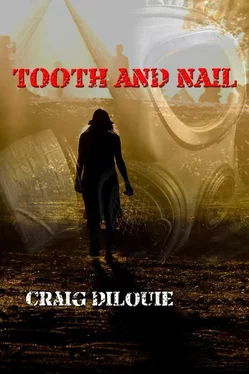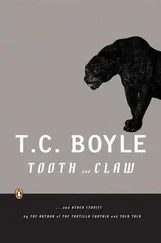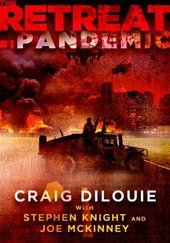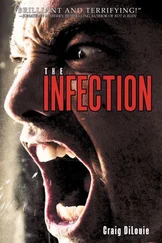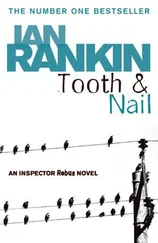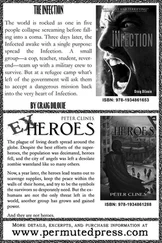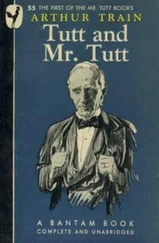“All right, this is it. We’ll be moving north on First Avenue in close column file on the west side sidewalk with scouts on our three o’clock.” He turns to Hicks. “Ray, you’re going to lead us there. I’d like you second in line. Who do you want on point?”
The soldiers blink and glance at each other. Even with the aggressive ROE, they expected to fall into a standard traveling formation with road guards to help block traffic. Instead, Ruiz is describing an attack formation, essentially a jungle file formation, for their one-mile foot march through the middle of New York City.
“Hawkeye,” says Hicks, recovering quickly. “He’s stashing our Kevlar. I’ll tell him when he gets back, Sarge.”
“Fine.” Ruiz now turns to Wheeler. “Adam, the LT will be right behind you with Headquarters and Weapons Squad. Keep a tight hold on them.”
“Roger that, Sergeant.”
“After Weapons Squad, McGraw and First Squad will bring up the rear. That’s the order of march for our column. We’ll have Lewis’ people moving parallel on our three o’clock for additional security and recon. They’ll be marching down the middle of the Avenue, through the abandoned vehicles that are out there, so they’ll be setting the tempo for the platoon’s movement. Any questions?”
McLeod and the other boys understand the tactics. The LT chose column file as their traveling formation because the street is clogged with vehicles, and moving in single file provides easy communication and mobility. Adding a second column file is ideal for moving fast through dense foliage, hence its nickname “jungle file,” and the LT probably believes it will be just as practical for quick movement through bumper-to-bumper vehicles and rubbish on the road. The second column complicates communication and movement but mitigates the main disadvantages of column file, which are greater vulnerability to a flank attack and inability to deliver much firepower against targets in front of the column.
The question on everybody’s mind is about the big picture.
“We’re treating a short march in Manhattan like a combat patrol,” says Hicks. “Who exactly is the enemy and what is the threat level, Sarge?”
“Civil authority is breaking down,” Ruiz says. “As we saw last night, the police here can’t control the growing number of Mad Dogs. We’re not cops. We don’t have non-lethals. But we have to defend ourselves. We have been cleared to shoot anybody who attacks us even if they are unarmed. If you have time, call in the target. If you don’t, take your shot. We are taking no chances with the Mad Dogs. Understood?”
“Hooah, Sergeant,” says Hicks.
The other boys simply nod sullenly. They’re not buying any of it, but they know better than to ask questions that have too fine a point.
“There’s one more thing I want to tell you before we move out,” Ruiz continues. “LT sent out a scouting party that got back just a little while ago. Word is we may see some horrible things while we’re on the move. I will understand if what you see makes you sad, mad, whatever.” His face darkens. “But if you break discipline and put the rest of the platoon in danger, I will put my boot so far up your ass I will be tying my laces in your mouth. Understood?”
“Yes, Sergeant,” the boys answer.
“Like you mean it, ladies.”
“Yes, Sergeant!” they shout.
“Any other questions?”
McLeod opens his mouth, but says nothing.
“All right then,” Ruiz tells them. “Now fix bayonets.”
Full battle rattle
The platoon steps off, two column files bristling with bayonets and strung out over sixty meters of ground. The boys are in full battle rattle, each carrying weapon and ammo, body armor, rucksack and two canteens full of New York City drinking water. It is a lot of weight but the boys feel light without their two-and-a-half-pound helmets. The air is muggy and the temperature is climbing in this late, last gasp of summer, making them sweat in their universal camouflage uniforms colored dark tan, light gray and brown in the desert/urban pattern. They move with weapons loaded, safeties off and cleared hot. Each soldier in the main column is spaced about two meters apart. Despite the low-grade racket caused by their clinking and banging gear, the platoon moves relatively quietly, shocked into silence by the scenes of devastation they’d been warned about by their squad leaders.
Behind them, the doctors and nurses who turned out to see them off begin to retreat back into the hospital, looking worried.
“Jesus,” Williams says after several blocks, wagging his head. “This is mad, major-league, mother of all wacked.”
“Are you rapping, Private?”
He glances behind to see McLeod, who grins and waves breezily over his weapon.
“Thought you were all nervous back there. This shit don’t bother you?”
McLeod stares back wearing an innocent expression. “What are you talking about?”
Williams shakes his head in wonder.
The truth is that after nearly a year in Baghdad’s most dangerous neighborhoods, seeing dead bodies and scorched property has become routine for PFC McLeod. The fact that the bodies are now American does not bother him. Instead, he feels annoyed. They offend him. McLeod has gotten through most of his young life using scorn and derision as a way to rationalize his failures, avoid traumatic stress reactions, and generally feel superior to everybody else. Scorn got him through Iraq, for example. He considered the Iraqis to be suicidal for continually taking on the world’s most powerful military, and therefore one couldn’t be blamed for helping by killing them.
And these New Yorkers, well, what we have here is a bunch of rich, successful people who got their comeuppance with a strong lesson in How the World Works. Specifically, that bad things happen to everybody regardless of who you are or what you’ve done, so it doesn’t really matter who you are and what you do.
“When was the last time we were asked to fix bayonets?” Williams wants to know. “Boot camp?”
“What I don’t get is if it’s so bad out here that we can’t walk a mile without a bullet in the chamber and bayonets fixed, then why didn’t we just stay where we were?” McLeod wonders aloud. “It’s like they’re trying to get us killed.”
“All I know is this place gives me the creeps,” says Williams. “There must be hundreds of dead people on First Avenue all the way up to the East River Tunnel. And nobody’s picking them up for burial. For some reason, that’s the worst part of it.”
From the back of the file, they can hear two guys from First Squad sing:
Study up on weaponry,
The M16, the M15,
Sammy knows the enemy,
Flim flam, big slam, tell the Major what you see.
Hut, hut, hut, hut!
The boys are starting to clown around to get their spirits up. Like McLeod, the other boys of Second Platoon have seen the worst and are already adapting to it, taking it in stride, getting their swagger back while they let their rage build up bit by little bit. Right about now, the new ROE does not sound so shocking to them. If Mad Dogs did this, then the soldiers are itching for some payback.
“Don’t tell me Rollins is trying to rap back there,” Williams adds, disgusted.
McLeod laughs. “Oh, man. It’s even better than that. Him and Carrillo are actually singing that old Blondie song, ‘Military Rap.’ That’s brilliant.”
“Blondie who?”
“Come on, dude. Blondie. Blondie!”
“Like I said. Who?”
“Oh, man, this is really great,” McLeod says with genuine feeling. “This mission has finally found its rock and roll soundtrack.”
Читать дальше
